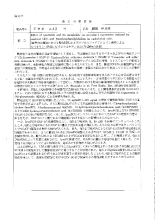Effect of quercetin and its metabolite on caveolin-1 expression induced by oxidized LDL and lysophosphatidylcholine in endothelial cells 血管内皮細胞における酸化LDLおよびリゾホスファチジルコリン誘導によるカベオリン-1発現に対するケルセチンおよび代謝物の効果
Access this Article
Search this Article
Author
Bibliographic Information
- Title
-
Effect of quercetin and its metabolite on caveolin-1 expression induced by oxidized LDL and lysophosphatidylcholine in endothelial cells
- Other Title
-
血管内皮細胞における酸化LDLおよびリゾホスファチジルコリン誘導によるカベオリン-1発現に対するケルセチンおよび代謝物の効果
- Author
-
鎌田, 智英実
- Author(Another name)
-
カマダ, チエミ
- University
-
徳島大学
- Types of degree
-
博士(栄養学)
- Grant ID
-
甲第2945号
- Degree year
-
2016-03-23
Note and Description
博士論文
Oxidized low-density lipoprotein contributes to atherosclerotic plaque formation, and quercetin is expected to exert anti-atherosclerotic effects. We previously reported accumulation of conjugated quercetin metabolites in the aorta of rabbits fed high-cholesterol diets with quercetin glucosides, resulting in attenuation of lipid peroxidation and inhibition of lipid accumulation. Caveolin-1, a major structural protein of caveolae in vascular endothelial cells, plays a role in atherosclerosis development. Here we investigated effects of oxidized low-density lipoprotein, quercetin and its metabolite, quercetin 3-O-β-glucuronide, on caveolin-1 expression. Oxidized low-density lipoprotein significantly upregulated caveolin-1 mRNA expression. An oxidized low-density lipoprotein component, lysophosphatidylcholine, also induced expression of both caveolin-1 mRNA and protein. However, lysophosphatidylcholine did not affect the location of caveolin-1 proteins within caveolae structures. Co-treatment with quercetin or quercetin 3-O-β-glucuronide inhibited lysophosphatidylcholine-induced caveolin-1 expression. Quercetin and quercetin 3-O-β-glucuronide also suppressed expression of adhesion molecules induced by oxidized low-density lipoprotein and lysophosphatidylcholine. These results strongly suggest lysophosphatidylcholine derived from oxidized low-density lipoprotein contributes to atherosclerotic events by upregulating caveolin-1 expression, resulting in induction of adhesion molecules. Quercetin metabolites are likely to exert an anti-atherosclerotic effect by attenuating caveolin-1 expression in endothelial cells.
